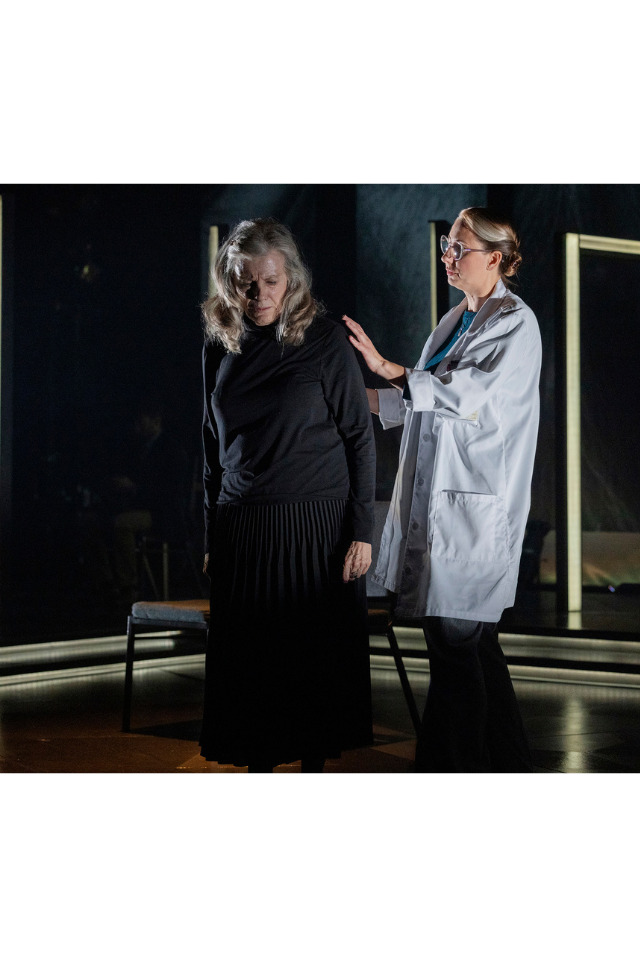
Review: ‘Make a point to see Pru Payne — but be prepared for both laughter and tears’
By Betsy Labiner. Originally published on Taming of the Review on March 16, 2023.
Pru Payne, written by Steven Drukman and directed by Sean Daniels, is a hard show to categorize. It’s timeless, firmly rooted in the 1980s but inarguably current. It’s funny, but bleak. It’s gentle and caustic in turns. It’s resigned, yet hopeful. Above all, it’s about relationships: complex, loving, frustrating, optimistic, hopeless, and accepting.
The opening of the show is laugh-out-loud funny; we meet Prudence Payne, played by Mimi Kennedy, in the midst of her being checked in to a medical center for testing and observation. Pru recently accepted a prestigious award with a side-splittingly irreverent and incendiary speech, and the resultant uproar has led her son to seek medical intervention for her behavioral changes and memory loss. Mimi Kennedy is absolutely magnificent as Prudence. Pru is brilliant, impatient, humorous, acerbic, idealistic, and so much more, and Kennedy steals our hearts with her opening monologue, then breaks them with every moment of confusion, as we watch the moments coalesce into an inexorable mental decline. She’s masterful in her depiction of the small slips, and gut-wrenching in her more extreme moments of dementia. The swings are often jarring, as they’re meant to be, made even more so by the flashes of light and changes in color that often indicate lost time, hallucinations, and more.
Kennedy’s stellar performance is supported by strong showings from all her co-stars, particularly Tristan Turner, who plays her son Thomas. Thomas is achingly vulnerable, and Turner embodies the full range of an adult who simultaneously doubts himself, yet believes in his abilities, who strives to impress his stratospherically successful mother, and resents that mother for casting such a long shadow. His emotional engagement in his interactions with both Kennedy and Greg Maraio heightened the tension and kept me rooting for a character who could have easily come off as elitist and unlikeable, if not for the moments of longing, softness, and love that Turner conveys with utter conviction. Maraio plays Art Cudahy and Gordon Clapp plays his father Gus Cudahy, the brusque, occasionally crass foils to the Paynes. Maraio and Clapp are remarkable in their father-son dynamic, veering between anger, tenderness, and the tension caused by the weight of expectations –both society’s and their own. Veronika Duerr rounds out the cast as Doctor Dolan, a physician trying to manage not only her patients, their symptoms, and the progress of their disease, but also their families’ high emotions. Duerr’s Dolan seems cold and frustrated at times, but we do see her professional detachment morph into something warmer and more personally engaged over the course of the play.
The actors’ work is buoyed by highly effective scenic and lighting choices from designers James J. Fenton and Philip S. Rosenberg, respectively. The enormous photograph on the backdrop shifts, deconstructs, and reconstructs over the course of the play, adding to the sense of loss, change, and uncertainty. The aforementioned flashing lights do similar work, jolting us from one moment to the next, startling us into empathy for the characters’ own confusion. Tina McCartney’s costume design silently builds out the characterization, including the slide over time from a put-together facade to something less concerned with appearances. The collective effect takes us on a two decades long journey in a swift 90 minutes.
Through both the comedy and the tragedy, the play focuses our attention on a handful of vital questions: Who upholds social standards, or even gets to decide what those standards are? How do we curate our own memories? What do we owe others in terms of how we remember them? This play asks big questions, connecting them not only to individuals, but whole communities, social movements, and large-scale implications.
Despite its humor and its hopefulness, this play is a painful one at many points, especially if you have personal experience loving someone with dementia. The pain, though, isn’t without purpose. Pru Payne is a journey of re-membering, of creation from pieces of a life. It spurs introspection and empathy, and is absolutely a play to see and to sit with long after the show has ended.